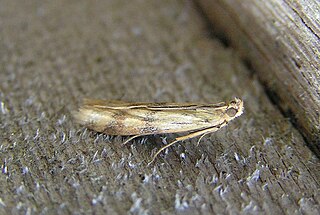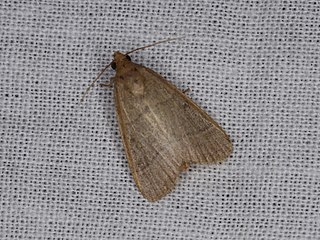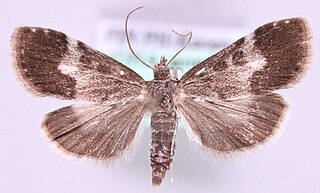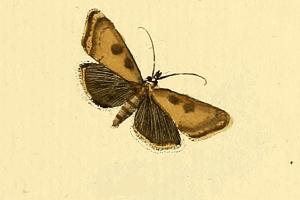
The Pyraloidea are a moth superfamily containing about 16,000 described species worldwide, and probably at least as many more remain to be described. They are generally fairly small moths, and as such, they have been traditionally associated with the paraphyletic Microlepidoptera.

Catoptria lythargyrella is a species of moth of the family Crambidae. It is found in Europe.

Udea ferrugalis, the rusty dot pearl, is a moth of the family Crambidae. The species was first described by Jacob Hübner in 1796.

Cadarena is a monotypic moth genus of the family Crambidae erected by Frederic Moore in 1886. Its only species, Cadarena pudoraria, was first described by Jacob Hübner in 1825. It occurs throughout tropical and subtropical Africa and in India.

Micromartinia is a genus of moths in the family Crambidae. It contains only one species, Micromartinia mnemusalis, which is found in Costa Rica, Brazil, French Guiana and Venezuela.

Homoeosoma sinuella is a moth of the family Pyralidae. It is found in Europe.
Anassodes is a monotypic snout moth genus. It was described by Alfred Jefferis Turner in 1932, and contains the species Anassodes mesozonalis. It is found in Australia, including the type location of Western Australia.
Anemosella basalis is a species of snout moth. It is found in Mexico and the US state of Arizona.
Basacallis is a monotypic snout moth genus. It was described by Everett D. Cashatt in 1969, and contains the species Basacallis tarachodes. It is found in Panama, Florida, Mississippi, Alabama, and South Carolina.

Anemosa exanthes is a species of snout moth in the genus Anemosa. It was described by Edward Meyrick in 1885, and is known from Australia.
Anemosa isadasalis is a species of snout moth in the genus Anemosa. It was described by Francis Walker, in 1859, and is known from Australia.
Arouva albivitta is a species of snout moth in the genus Arouva. It was described by Cajetan Felder, Rudolf Felder and Alois Friedrich Rogenhofer in 1875, and is known from Brazil.
Blepharocerus rosellus is a species of snout moth in the genus Blepharocerus. It was described by Charles Émile Blanchard in 1852. It is found in Chile.

Bonchis munitalis is a species of snout moth in the genus Bonchis. It was described by Julius Lederer in 1863, and is known from Honduras, the Dominican Republic, Brazil and Venezuela. It is also found in the southern United States, including Florida. Adults of this species were found in the month of October. Host plants include, Crescentia cujeta, Parmentiera cereifera, and Tabebuia rosea.

Ephestia welseriella is a species of snout moth in the genus Ephestia. It was described by Zeller in 1848. It is found from the Iberian Peninsula north to France and Germany and east to Ukraine and southern Russia.

Hypsopygia nostralis, the southern hayworm moth, is a species of snout moth. It was described by Achille Guenée in 1854. It has a wide distribution and is found in most of South America, Saint Helena, Réunion, Mauritius, Puerto Rico and in the southern United States, from Texas to Florida and Madagascar

Udea hamalis is a species of moth in the family Crambidae described by Carl Peter Thunberg in 1788. It is found from Fennoscandia south to Switzerland and Ukraine and from France east to Russia.

Udea nebulalis is a species of moth in the family Crambidae. It is found in France, Switzerland, Austria, Italy, Germany, Poland, the Czech Republic, Slovakia, Slovenia, Croatia, Bosnia and Herzegovina, Serbia and Montenegro, Bulgaria, Romania, Estonia and Fennoscandia.
Catoptria maculalis is a species of moth in the family Crambidae. It is found in Germany, Poland, the Czech Republic, Slovakia, Switzerland, Austria, Italy, Fennoscandia, Russia, Quebec, Labrador and the Yukon.
Mecyna trinalis is a species of moth in the family Crambidae. It is found in France, Spain, Italy, Austria, the Czech Republic, Slovakia, Poland, Hungary, the Balkan Peninsula, Ukraine, Russia, Turkey and North Africa, including Algeria and Morocco.











